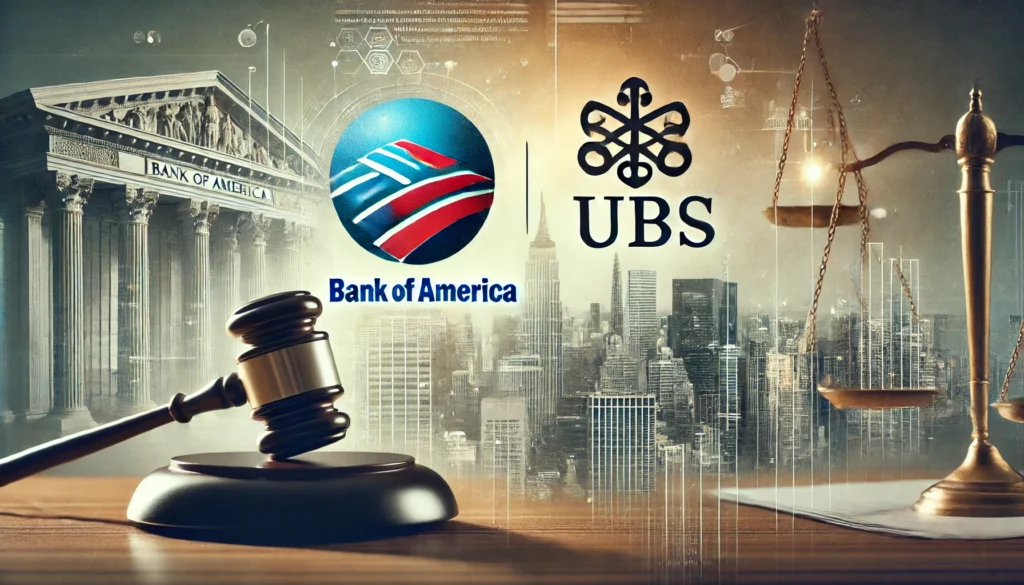In the ever-competitive world of finance, disputes between major players are not uncommon. Recently, news broke that Bank of America faces a new lawsuit from UBS, a legal development that has drawn significant attention from the financial industry and beyond. As details unfold, the implications of this case could potentially reshape aspects of banking practices, regulatory scrutiny, and investor trust.
This article examines the background of the lawsuit, the key allegations, and the potential impact on both financial giants.
The Background: Bank of America vs. UBS
1. Who Are the Key Players?
- Bank of America (BoA): One of the largest banking institutions in the United States, offering services in wealth management, investment banking, and consumer banking.
- UBS: A leading Swiss investment bank and financial services company known for its global reach and focus on wealth management.
2. The Context of the Lawsuit
The origins of the dispute lie in alleged financial mismanagement, potential breaches of contract, or regulatory non-compliance. While specific details remain under legal review, UBS has filed the lawsuit, alleging misconduct that could involve:
- Improper handling of financial agreements.
- Breaches of fiduciary duties.
- Misrepresentation in financial transactions.
Key Allegations in the Lawsuit
The lawsuit filed by UBS outlines several serious allegations against Bank of America.
1. Breach of Contract
UBS claims that agreements made with Bank of America were not upheld, leading to financial losses.
2. Misrepresentation
Allegations of misleading financial information or improper disclosures have been made. This could involve:
- Inaccurate reporting of financial data.
- Misrepresentation of risks associated with certain transactions.
3. Regulatory Concerns
Potential violations of regulatory standards could also be part of the case, which might attract the attention of federal authorities.
4. Damages Sought
UBS is reportedly seeking compensation for damages, which could amount to millions or even billions of dollars, depending on the court’s findings.
Implications of the Lawsuit for the Financial Sector
1. Reputational Risks
Both institutions face scrutiny from investors, clients, and regulators. A prolonged legal battle could harm their reputations.
2. Regulatory Oversight
This case may prompt stricter regulatory measures for financial institutions to ensure compliance with industry standards.
3. Impact on Market Confidence
Legal disputes between major banks can lead to fluctuations in market confidence, potentially affecting stock prices and investor behavior.
How Similar Lawsuits Have Unfolded in the Past
The banking industry has seen several high-profile legal battles over the years. Examining these cases provides insights into the potential outcomes of the current lawsuit.
1. JPMorgan Chase vs. Federal Regulators
- Allegations: Improper mortgage practices.
- Outcome: A settlement exceeding $13 billion, highlighting the financial stakes in such cases.
2. Goldman Sachs and the 1MDB Scandal
- Allegations: Misuse of funds and regulatory breaches.
- Outcome: Heavy fines and reputational damage, emphasizing the long-term effects of legal disputes.
3. Wells Fargo Account Fraud Scandal
- Allegations: Unauthorized account openings.
- Outcome: Fines, executive resignations, and a loss of public trust.
Potential Outcomes of the Bank of America vs. UBS Case
1. Settlement
Most cases of this nature are resolved through settlements, where the defendant agrees to pay damages without admitting wrongdoing.
2. Prolonged Legal Battle
If neither side agrees to settle, the case could go to trial, extending the timeline and increasing legal costs.
3. Regulatory Action
Should regulatory breaches be proven, both institutions could face additional penalties from oversight bodies.
Steps Bank of America and UBS Might Take
For Bank of America:
- Legal Defense: Assembling a team of top legal professionals to counter the allegations.
- Internal Review: Conducting audits to ensure compliance with financial regulations.
- Reputation Management: Engaging with media and stakeholders to maintain public trust.
For UBS:
- Strengthening Claims: Providing robust evidence to support their allegations.
- Seeking Settlements: Negotiating favorable terms to avoid prolonged litigation.
- Client Assurance: Communicating with clients to ensure confidence in their services.
FAQs About the Bank of America vs. UBS Lawsuit
What is the lawsuit about?
UBS has filed a lawsuit against Bank of America, alleging breaches of contract and financial misconduct.
How much is UBS seeking in damages?
While exact figures are unknown, damages could potentially reach millions or billions of dollars.
What impact could this have on the banking sector?
The lawsuit may lead to increased regulatory oversight and fluctuations in market confidence.
Has Bank of America faced similar lawsuits before?
Yes, like many large banks, Bank of America has dealt with legal disputes, particularly following the 2008 financial crisis.
What happens if the case goes to trial?
A trial could extend the timeline, increase costs, and result in heightened scrutiny for both banks.
Could this lead to regulatory penalties?
If regulatory violations are proven, penalties and increased oversight are likely outcomes.
What are the reputational risks involved?
Both institutions risk losing investor and client trust, which could impact their market positions.
Strategies for Investors and Clients During Legal Disputes
For those invested in or working with either institution, maintaining a proactive approach is essential.
1. Monitor Developments
Stay updated on the lawsuit’s progress through credible news sources.
2. Diversify Investments
Reducing exposure to a single institution can minimize financial risks during uncertain times.
3. Engage with Financial Advisors
Professionals can provide tailored advice based on market conditions and potential outcomes.
How the Banking Industry Can Learn from This Case
1. Importance of Transparency
Maintaining clear and accurate communication with clients and regulators is crucial.
2. Strengthening Compliance Systems
Investing in robust compliance measures can prevent similar disputes in the future.
3. Fostering Ethical Practices
Encouraging a culture of ethics and accountability within financial institutions is essential for long-term success.
Conclusion
As Bank of America faces a new lawsuit from UBS, the financial world watches closely. This legal battle highlights the complexities and high stakes of the banking industry, where trust, transparency, and compliance are paramount. Regardless of the outcome, this case serves as a reminder of the importance of ethical practices and robust regulatory frameworks in maintaining confidence in global financial institutions.



